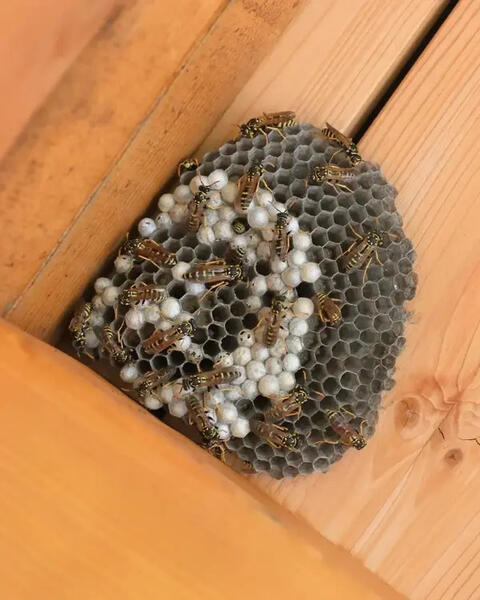Bee Removal Las Vegas, NV
Get rid of bees or wasps in Las Vegas
“Each service comes with a full inspection of the property, de webbing, crack crevice treatment, perimeter of property, rock, and tree treatment. All harborage areas included in spray”
Don´t be afraid to call now
What kind of bug is a wasp?
 A wasp is any insect of the narrow-waisted suborder Apocrita of the order Hymenoptera.
A wasp is any insect of the narrow-waisted suborder Apocrita of the order Hymenoptera.
The most commonly known wasps, such as yellowjackets and hornets, are in the family Vespidae and are eusocial, living together in a nest with an egg-laying queen and non-reproducing workers.
When and where can we find wasps in Las Vegas?
Wasps are considered pests when they become huge in number, or nests are close to buildings. They usually sting humans in late summer and early autumn, when wasp colonies stop breeding new workers and they have to go out looking for food.
When near humans, wasp nests are usually made in or near houses, such as in roof spaces, window frames or corners at the ceiling.
If you see any of them in your home, give me a call 702-425-2742
How do I get rid of them?
Treatment consist of residual flush and dust. We at josh the bug guy will always do inspection first, then treat the problem.

Bee Removal in Las Vegas, NV: Protecting Your Property and the Bees
Las Vegas, Nevada, known for its vibrant nightlife and entertainment, also shares its landscape with a variety of buzzing inhabitants: bees. While bees play a crucial role in the ecosystem, their presence in or around your home or business can pose a threat, especially if you have children or individuals with allergies. Bee removal Las Vegas, NV, is a specialized service that safely and effectively removes unwanted bee infestations, ensuring both your safety and the well-being of these essential pollinators. This comprehensive guide explores the nuances of bee removal, highlighting the importance of humane practices, the different types of bees encountered in Las Vegas, and the benefits of seeking professional bee removal services.
Understanding Bee Infestations in Las Vegas
Las Vegas’s warm climate and diverse flora make it an attractive habitat for various bee species, including honey bees, wasps, and even the notorious Africanized bees. These insects play a vital role in pollinating plants, but their presence in close proximity to humans can lead to conflicts. Bee hives and wasp nests can be found in a variety of locations, such as trees, eaves, walls, and even underground. While some bee species are docile, others, like Africanized bees, can be aggressive and pose a sting risk.
The Importance of Humane Bee Removal
Bees are essential pollinators, contributing significantly to the environment and agricultural productivity. Therefore, it’s important to prioritize humane bee removal methods that avoid killing the bees. Live bee removal involves relocating the bee colony to a safe location where they can continue their beneficial activities. This approach not only protects the bees but also promotes ecological balance.
Types of Bees in Las Vegas
- Honey Bees: These are the most common bees found in Las Vegas. They are generally docile and only sting when they feel threatened. Honey bees are valuable pollinators and play a crucial role in the food supply chain.
- Wasps: Unlike honey bees, wasps are predators and can be more aggressive. They build nests in various locations, including eaves, trees, and underground. Wasp stings can be painful and may cause allergic reactions in some individuals.
- Africanized Bees: Also known as “killer bees,” these bees are a hybrid of African and European honey bees. They are more aggressive than European honey bees and are known for their swarming behavior. Africanized bee stings can be dangerous, especially for individuals with allergies.
- Yellow Jackets: These wasps are social insects that build nests underground or in cavities. They are attracted to sugary foods and drinks and can become aggressive when disturbed. Yellow jacket stings are painful and can trigger allergic reactions.
Bee Removal Las Vegas: Professional Services
When faced with a bee infestation, it’s crucial to seek professional bee removal services in Las Vegas, NV. Attempting to remove bees or wasps on your own can be dangerous, especially if you are dealing with Africanized bees or have allergies. Professional beekeepers have the expertise, protective gear, and specialized tools to safely remove bee hives and wasp nests without harming the bees or putting themselves at risk.
The Bee Removal Process
- Inspection: A bee removal specialist will first inspect your property to identify the type of bee or wasp, locate the nest, and assess the extent of the infestation.
- Removal: The beekeeper will then employ appropriate methods to remove the bees or wasps and their nest. This can involve live bee removal techniques, where the bees are carefully transferred to a new location, or extermination in cases where the bees pose a significant threat.
- Cleanup: After the removal process, the beekeeper will clean up the area, removing any remaining debris and honeycomb.
- Prevention: To prevent future infestations, the beekeeper may recommend sealing entry points and implementing other preventive measures.
Benefits of Professional Bee Removal
- Safety: Bee removal experts prioritize safety, ensuring that the removal process is carried out without harming you, your family, or your pets.
- Effectiveness: Professionals have the knowledge and tools to safely and effectively remove bee infestations, minimizing the risk of recurrence.
- Humane Practices: Reputable bee removal services prioritize live bee removal whenever possible, contributing to the conservation of these important pollinators.
- Peace of Mind: Knowing that your bee problem is being handled by professionals can provide you with peace of mind and allow you to focus on other aspects of your life.
Bee Safe Las Vegas: Choosing the Right Service
When selecting a bee removal service in Las Vegas, consider the following factors:
- Experience: Choose a company with extensive experience in bee removal and a proven track record of successful outcomes.
- License and Insurance: Ensure that the company is licensed and insured to protect yourself from liability in case of any accidents or damages during the removal process.
- Humane Practices: Prioritize companies that offer live bee removal options and avoid those that resort to unnecessary killing of bees.
- Customer Service: Look for a company with excellent customer service, responsive communication, and transparent pricing.
- Guarantee: Inquire about the company’s guarantee or warranty to ensure that they will address any recurring issues.
In sum up
Bee removal in Las Vegas, NV, is a specialized service that requires expertise and caution. By seeking professional assistance, you can ensure the safe and effective removal of bee infestations while also contributing to the conservation of these vital pollinators. Don’t let bees become a nuisance in your home or business. Contact a reputable bee removal service in Las Vegas today to protect your property and the bees.
Get In Touch for a Pest-Free Peace of Mind
If you're located in North Las Vegas, Summerlin, Boulder City, or any surrounding areas, don't let pests take over your peace of mind. We're committed to providing high-quality pest control services to residential and commercial properties across the Las Vegas NV area. Whether you're dealing with an ant infestation or need specialized services like termite control, we’re your go-to experts. So don’t hesitate—call us to set up an appointment window that fits your schedule.
Call for a Free Quote
Josh The Bug Guy
Happy to Serve Our Community
I have been in the industry for over 17 years, always providing professional services for your pest problems.
Bugs Control in Las Vegas
German Roaches Exterminator in Las Vegas
Scorpions Exterminator in Las Vegas
Bed Bugs Exterminator in Las Vegas
Bees/Wasps Exterminator in Las Vegas
Rats Exterminator in Las Vegas
Ants Exterminator in Las Vegas
Spiders Exterminator in Las Vegas
Flies Exterminator in Las Vegas

